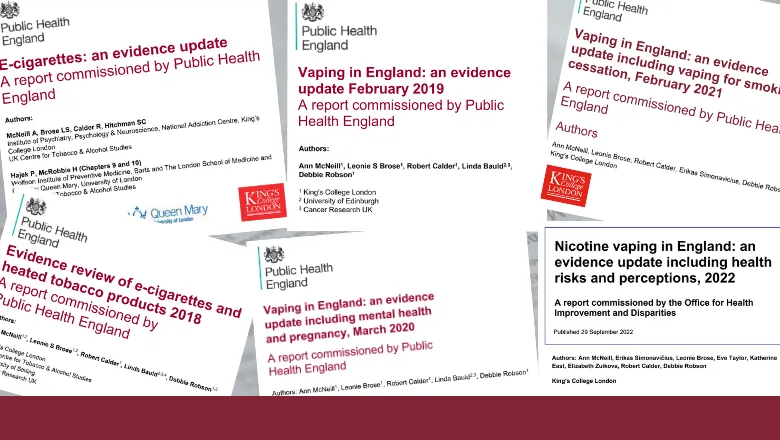Our Nicotine Research Group at King’s quickly picked up the gauntlet to study vaping products, investigating who was using them, how and why, as well as synthesising the global evidence on their impact on public health. The evidence indicated that when appropriately regulated and used, e-cigarettes helped smokers to stop and offered a much less harmful means of continuing nicotine use for those that wished to do so.
Professor Ann McNeill, Professor of Tobacco Addiction and Nicotine Research Group lead at the IoPPN, King's College London
04 December 2022
Cigarettes kill over half of their long-term users. The World Health Organisation (WHO) considers the tobacco epidemic to be one of the biggest public health threats the world has ever faced, killing more than 8 million people per year worldwide. E-cigarettes and vaping products offer a substantially less harmful alternative, but there has been a heated debate about their use and there is variation in approaches to regulation.
Cigarettes kill over half of their long-term users. The World Health Organisation (WHO) considers the tobacco epidemic to be one of the biggest public health threats the world has ever faced, killing more than eight million people per year worldwide. Smoking and exposure to second-hand smokes cause 65,000 deaths per year in England alone. It remains the largest single risk factor for death and ill-health, and is a leading cause of health inequalities in England.
E-cigarettes (vaping products) offer a substantially less harmful alternative, but there has been a heated debate about their use and wide variation in approaches to regulation. Against a backdrop of controversy and disparate knowledge, the Nicotine Research Group at King’s has provided a much-needed body of research to enable an evidence-based approach to policy-making in this area.
Ann McNeill, Professor of Tobacco Addiction at the Institute of Psychiatry, Psychology & Neuroscience (IoPPN), said: "As Professor Michael Russell from the, then, Institute of Psychiatry said over 40 years ago, ‘Smokers smoke for the nicotine, but die from the tar’. Since then, various less harmful nicotine delivery systems have been developed. However, e-cigarettes were the first to mirror the act of smoking whilst delivering decent doses of nicotine, and they quickly became popular alternatives to tobacco cigarettes".
Replacing one addiction with another?
By 2010, e-cigarettes had entered the market as a means of delivering the main addictive substance in smoking – nicotine - whilst avoiding many of the harmful ingredients of cigarettes. In 2022, about eight per cent of adults in England used e-cigarettes, and tobacco use had dropped from 19.8 per cent of adults in 2011 to 13.9 per cent. The increased use of e-cigarettes was surrounded by debate, fueled by misconceptions that nicotine was the harmful ingredient in tobacco and that these products were simply replacing one harmful addiction with another.
The best evidence that was available in 2015 demonstrated that e-cigarettes are unlikely to exceed five per cent of the harms associated with smoking tobacco. In this controversial area, there was an unmet need for robust, meaningful research to cut through the noise. By addressing the unanswered questions around use and impact of e-cigarettes, King’s research provided an evidence base for policy decisions and public health recommendations.
Building the foundations for e-cigarette policy in England
Globally, King’s researchers were one of the first groups to study e-cigarette use. Their research in this area identified not only that e-cigarette use helps tobacco smokers quit smoking, but also that the type and frequency of e-cigarette use impacted the likelihood of reduced smoking harm. For example, daily e-cigarette use was associated with reduced tobacco smoking and a higher number of attempts to quit smoking altogether during the next year. Furthermore, those using e-cigarettes with a re-fillable liquid tank daily were more likely to have quit smoking compared to those not using e-cigarettes. King’s researchers revealed the consequences of widespread misperceptions about the relative harm of e-cigarettes. These findings provided valuable insights into the level of knowledge amongst smokers about the harm of e-cigarettes compared to traditional smoking.
We know that more than half of all long-term smokers will die early because of smoking. But in England, seven out of ten adult smokers think vaping is at least as harmful as smoking or are unsure. Such misperceptions were even worse in smokers from more disadvantaged groups and among smokers from black and minority ethnic groups. These figures show a failure to communicate the evidence to those affected by the harms of smoking.
Dr Leonie Brose, Reader in Addiction Education and Nicotine Research at the IoPPN, King's College London (from 2021 PHE review)
A primary element of the debate around e-cigarettes is the concern that young people who did not previously smoke will start vaping, and this use of e-cigarettes could increase the subsequent risk of tobacco smoking. King’s research has found that there are associations in both directions between trying an e-cigarette and trying tobacco smoking. According to the latest data from the Action on Smoking and Health (ASH) 2022 survey commissioned by YouGov, over the last two years the number of 11- to 18-year-olds who vape has increased from 4.8 per cent in 2020 to 8.6 per cent in 2022. Nonetheless, 98 per cent of young people who have never smoked are also not currently vaping. The Nicotine Research Group continues to monitor e-cigarette use by young people given the rapid evolution of vaping products on the market.
King’s Public Health England Evidence Reviews
Public Health England (PHE - now Office for Health Improvement and Disparities and UK Health Security Agency) existed to protect and improve the nation’s health and wellbeing by providing evidence-based professional, scientific and delivery expertise. Based on King’s ground-breaking work in the area of vaping, PHE commissioned King’s researchers to summarise the evidence on e-cigarettes in six independent evidence reviews.
These reviews - published in 2015, 2018, 2019, 2020, 2021 and 2022 - received global attention. They have informed policy and are the means by which the government monitors the use and impact of e-cigarettes among adults and youth, as well as identifying areas of interest for future research and policy.

The reviews underpin the UK government’s Tobacco Control Plan for England, authored by the Department of Health and Social Care, which includes aims to support harm reduction with alternative forms of nicotine such as e-cigarettes.
The impact of King’s research and these reviews has spread wide within England. NICE guidance and advice for ‘stop smoking services’ has been informed by King’s research and the King’s 2018 PHE evidence review, and now uses recommendations on e-cigarettes as a harm-reduction strategy. Evidence from the 2015 and 2018 King’s reviews underpins the National Centre for Smoking Cessation and Training (NCSCT) stop smoking practitioner training, which includes a section on e-cigarettes. In 2018, the NCSCT produced a series of five public health information films for PHE, ‘E-cigarette safety: the facts explained’. The films aimed to counter misperceptions about the harms of e-cigarettes highlighted in King’s research. One of these features Professor Ann McNeill which, to date, has 457,629 views on YouTube.
Based on King’s PHE Reviews, PHE have issued advice on the use of e-cigarettes in the workplace and public spaces to help employers and organisations develop their own policies. The Royal College of General Practitioners (RCGP) position statement on e-cigarettes directs UK GPs to the King’s 2015 PHE Review and to the NCSCT training as means to inform GPs of the use of e-cigarettes as part of a harm-reduction approach.
The impact of King’s research also reached further afield. On the basis of King’s PHE Reviews, the New Zealand Ministry of Health recommended that the government support smokers to switch to significantly less harmful nicotine alternatives. This was instrumental in New Zealand legalising nicotine vaping products in 2018.
The 2021 PHE review showed that perceptions about the relative harms of smoking and vaping among adult smokers are increasingly out of line with the evidence. Among adult smokers, only 29 per cent believed vaping was less harmful than smoking, while 38% thought they were equally harmful and another 15 per cent believed vaping to be more harmful than smoking.
The most recent 2022 PHE review is the most comprehensive to date, reviewing the potential health risks of nicotine vaping. Although the report highlights that vaping is not risk-free, particularly for those who have never smoked, vaping poses a small fraction of the risks of tobacco smoking in the short and medium term.
Using research to achieve a ‘Smoke-Free’ England
The 2019 Government Green Paper ‘Advancing our health: prevention in the 2020s’ cites the 2018 King’s PHE Review, stating that e-cigarettes are a helpful contribution to a harm reduction strategy in smokers, and recommending their use.
It stated: ‘We are setting an ambition to go 'smoke-free' in England by 2030. This includes an ultimatum for industry to make smoked tobacco obsolete by 2030, with smokers quitting or moving to reduced risk products like e-cigarettes.’
Statistics from NHS Digital showed that in 2018 - 2019, 'stop smoking services' supported 236,175 attempts to stop smoking. Those attempts in which clients used e-cigarettes have achieved the highest self-reported quit rates compared with prescription medication and Nicotine Replacement Therapy, indicating that the revisions of training based on King’s research has saved countless lives.





